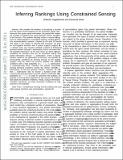| dc.contributor.author | Jagabathula, Srikanth | |
| dc.date.accessioned | 2012-10-01T18:07:32Z | |
| dc.date.available | 2012-10-01T18:07:32Z | |
| dc.date.issued | 2011-11 | |
| dc.date.submitted | 2011-11 | |
| dc.identifier.issn | 0018-9448 | |
| dc.identifier.uri | http://hdl.handle.net/1721.1/73523 | |
| dc.description.abstract | We consider the problem of recovering a function over the space of permutations (or, the symmetric group) over n elements from given partial information; the partial information we consider is related to the group theoretic Fourier Transform of the function. This problem naturally arises in several settings such as ranked elections, multi-object tracking, ranking systems, and recommendation systems. Inspired by the work of Donoho and Stark in the context of discrete-time functions, we focus on non-negative functions with a sparse support (support size <;<; domain size). Our recovery method is based on finding the sparsest solution (through l[subscript 0] optimization) that is consistent with the available information. As the main result, we derive sufficient conditions for functions that can be recovered exactly from partial information through l[subscript 0] optimization. Under a natural random model for the generation of functions, we quantify the recoverability conditions by deriving bounds on the sparsity (support size) for which the function satisfies the sufficient conditions with a high probability as n → ∞. ℓ0 optimization is computationally hard. Therefore, the popular compressive sensing literature considers solving the convex relaxation, ℓ[subscript 1] optimization, to find the sparsest solution. However, we show that ℓ[subscript 1] optimization fails to recover a function (even with constant sparsity) generated using the random model with a high probability as n → ∞. In order to overcome this problem, we propose a novel iterative algorithm for the recovery of functions that satisfy the sufficient conditions. Finally, using an Information Theoretic framework, we study necessary conditions for exact recovery to be possible. | |
| dc.language.iso | en_US | |
| dc.publisher | Institute of Electrical and Electronics Engineers (IEEE) | |
| dc.relation.isversionof | http://dx.doi.org/ 10.1109/tit.2011.2165827 | en_US |
| dc.rights | Creative Commons Attribution-Noncommercial-Share Alike 3.0 | en_US |
| dc.rights.uri | http://creativecommons.org/licenses/by-nc-sa/3.0/ | en_US |
| dc.source | arXiv | en_US |
| dc.title | Inferring rankings using constrained sensing | en_US |
| dc.type | Article | en_US |
| dc.identifier.citation | Jagabathula, S.; Shah, D.; , "Inferring Rankings Using Constrained Sensing," Information Theory, IEEE Transactions on , vol.57, no.11, pp.7288-7306, Nov. 2011 | |
| dc.contributor.department | Massachusetts Institute of Technology. Department of Electrical Engineering and Computer Science | en_US |
| dc.contributor.approver | Shah, Devavrat | |
| dc.contributor.mitauthor | Jagabathula, Srikanth | |
| dc.contributor.mitauthor | Shah, Devavrat | |
| dc.relation.journal | IEEE Transactions on Information Theory | |
| dc.eprint.version | Author's final manuscript | en_US |
| dc.type.uri | http://purl.org/eprint/type/JournalArticle | en_US |
| eprint.status | http://purl.org/eprint/status/PeerReviewed | en_US |
| dspace.orderedauthors | Jagabathula, Srikanth; Shah, Devavrat | en |
| dc.identifier.orcid | https://orcid.org/0000-0003-0737-3259 | |
| dspace.mitauthor.error | true | |
| mit.license | OPEN_ACCESS_POLICY | en_US |
| mit.metadata.status | Complete | |
